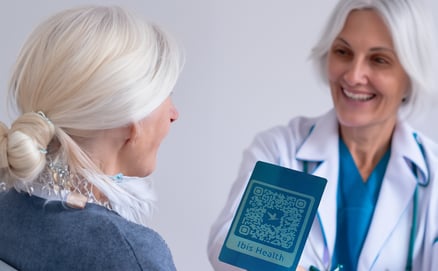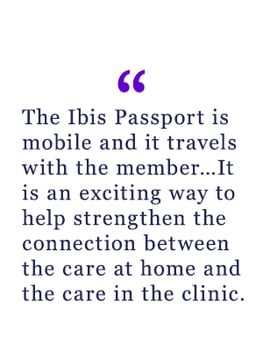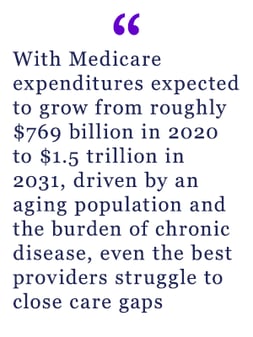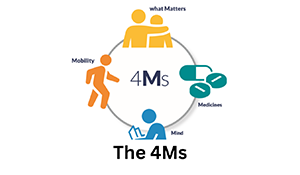Senscio to provide whole person care to members with chronic conditions including COPD, heart...
Senscio's Ibis Passport: Connecting Home and Clinic
The new Ibis Passport makes it easy to access patient data where it's needed most - in the exam room.

Caring for individuals with complex chronic health can be difficult, especially when time is limited and the next patient is waiting. The Ibis Passport makes it easier to understand how a patient has been doing at home between visits, giving providers a window into monitored vitals and self-reported symptoms that is efficient and easily accessible.

Increasing patient engagement and self-care
Defining a new care model for the nearly 80 percent of older Americans with two or more chronic conditions, Senscio's Ibis Health Program works with a member’s primary care team and specialists to increase engagement, care plan adherence and self-management of chronic health conditions. Through daily support from a dedicated care team and AI-guided reminders and workflows, Ibis empowers members to take greater control of their chronic conditions so they can remain independent and healthy at home.
Senscio recently launched the Ibis Passport - a plastic card the size of a credit card which allows Ibis Program members and their providers to access self-reported health data on the go. This creates an easy way to share data with medical providers or family. Information about trends in blood pressure, blood sugars, weight and other indicators is as close as a wallet or in the palm of a patient’s hand.
The goal is to bridge the gaps between care that members receive in their doctor’s office and the efforts and work they are doing at home through the Ibis platform to help keep themselves healthy in between visits, said Dr. Karthik Ravindran, MD, Medical Director for Ibis Health and a board-certified internist who specializes in chronic care management.
“It’s an exciting way to help strengthen the connection between the care at home and the care in the clinic, and hopefully improve the experience that patients have with their providers out in the community,” Dr. Ravindran said. “The Ibis Passport is mobile, and it travels with the member.”

Making provider office visits more efficient
Each Ibis Passport contains a QR code that is unique to the member. A quick scan allows members or anyone else they choose to share it with access to reports that show their latest vitals, adherence to medications, exercise and other data, including graphs that display trends over time. The health data accessible through the QR code is completely secure, with end-to-end data encryption and no personal identifying information attached, to protect members’ privacy. Members can take the Ibis Passport to their appointments, allowing their medical providers to quickly see how they are doing and any progress they’ve made.
“In a 15-minute visit, physicians spend about 8-9 minutes just trying to gather information about what’s happened in the last six months or year, and this allows members to just hand the information to them,” Dr. Ravindran said. “This gives them more time with their providers to actually discuss their goals and any other concerns they have, because they are not spending time on data gathering.”
“I think medical providers are really going to like this,” said Melissa Tutlis, an Ibis Health Member Advocate who has helped spearhead development of the Ibis Passport. “Members have something they can show to their providers and it’s easily accessible — it fits easily into their wallet and they can carry it with them.”
Closing care gaps and increasing quality
The Ibis Passport could also help providers make better informed decisions for patients by adding historical context to what they observe in the office, Dr. Ravindran said. For example, if a blood pressure reading in the office is high but data show a member’s readings at home have been great, the provider may be more inclined to continue monitoring rather than jumping to a more aggressive approach.
“If I were able to get information like this for every person coming into my office, it makes my job so much easier and eases the stress on me as a provider,” Dr. Ravindran said. “This will be beneficial across the entire care continuum.”
How Senscio's AI powers the Ibis Passport
Designed for Medicare beneficiaries with two or more chronic conditions, the Ibis Program utilizes a remote care team guided by Senscio's patented care management AI. Self-reported data create insights for timely intervention and early detection, and advocates work one-on-one to provide coaching and support, allowing many Ibis members to improve their health and achieve their goals in ways that work for them.
Senscio's AI creates a Digital Twin for every Ibis member (often referred to as a Digital Twin for Health or DT4H), capturing the member's self-management behaviors, health status, interactions with the clinical care team, and healthcare services utilization. Subtle or sudden changes in the Digital Twin is recognized and interventions are prompted, and the Ibis Passport provides visibility into the Digital Twin, its current state and recent trends.
Media contact: media@sensciosystems.com




